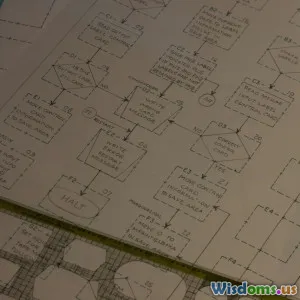
Mini Goals: The Secret to Sustained Motivation and Success
7 min read Discover how mini goals fuel motivation and pave the way for lasting success through actionable strategies. (0 Reviews)
Mini Goals: The Secret to Sustained Motivation and Success
Introduction
Why do some people seem to effortlessly stay motivated and achieve their dreams, while others plateau or give up along the way? The difference often lies in one simple strategy many overlook: mini goals. These smaller, manageable targets act as stepping stones that keep us energized, focused, and steadily progressing toward bigger ambitions.
Pioneering psychologists affirm that breaking large objectives into manageable chunks triggers continuous motivation by offering frequent rewards for our efforts. Instead of feeling overwhelmed by a daunting, distant goal, mini goals create clarity and build unstoppable momentum. This article delves into how mini goals work, their psychological impact, and practical ways you can apply them to sustain motivation and unlock long-term success.
The Science Behind Motivation and Mini Goals
Traditional goal setting often involves outlining a distant endpoint—like losing 50 pounds, writing a book, or landing the dream job—that can feel monstrous in scope. According to Edwin Locke’s Goal-Setting Theory, specific, challenging, yet attainable goals drive higher performance. Mini goals fit this framework perfectly by being specific, measurable, and immediately actionable.
Moreover, the concept of the "progress principle," introduced by Teresa Amabile and Steven Kramer, highlights that people feel more motivated when they see meaningful progress in their work—even if the steps are small. Mini goals help maintain this sense of progress by providing regular wins that produce dopamine surges, associated with reward and motivation.
Example: Microlearning in Education
In educational settings, microlearning techniques break complex subjects into bite-sized lessons, allowing students to master sections systematically. This aligns with using mini goals to simplify tasks and boost intrinsic motivation.
Types of Mini Goals and How They Impact Motivation
- Process-Oriented Goals: Focus on actions and habits, such as practicing a skill for 15 minutes daily or submitting one draft each week.
- Performance Goals: Aim for immediate, measurable outcomes like completing 5 pages or increasing sales by a specific percentage monthly.
- Outcome Goals: Smaller milestones on the path to a larger result—for instance, achieving a certificate before pursuing a degree.
Focusing on process goals, especially, fosters sustained motivation because they emphasize control and daily behavior, making progress feel attainable regardless of external factors.
Practical Strategies to Implement Mini Goals Effectively
1. Break Down Overwhelming Objectives
Instead of starting with the shadow of a huge goal, dissect it into manageable steps. For example, if your goal is to write a novel, your mini goals could be:
- Write 200 words daily
- Complete an outline in one week
- Finish Chapter 1 by month-end
This avoids decision fatigue and builds momentum.
2. Use SMART Criteria for Mini Goals
Ensure that your mini goals are Specific, Measurable, Achievable, Relevant, and Time-bound. This clarity boosts commitment and confidence.
3. Celebrate Small Wins
Don’t downplay mini goal completion. Did you hit your daily 200 words? Celebrate by enjoying a favorite activity—this reinforces positive habits and motivation.
4. Track Progress Visually
Tools like checklists, progress bars, or apps help highlight ongoing achievements. Visual proof sparks dopamine release and motivation.
5. Adjust as Needed
Mini goals aren’t set in stone. If a step feels too ambitious or too easy, recalibrate. Flexibility ensures you stay challenged without burnout.
Real-World Insights: Mini Goals in Action
The Story of Thomas Edison
Edison famously said, "I have not failed. I've just found 10,000 ways that won't work." This mentality is consistent with mini goal setting—breaking down monumental inventions into continuous small tests, learning, and adapting, which enabled eventual success.
S.T.A.R. Athletes and Incremental Progress
Elite athletes train through incremental mini goals—improving reaction time by milliseconds or adding slight weights progressively. These micro-adjustments accumulate into championship-winning performances.
Corporate Success: Agile Project Management
Agile methodology popular in tech fields exemplifies mini goals via "sprints"—short, focused periods aimed at achieving specific deliverables. This approach maintains team motivation and rapid iteration.
Overcoming Challenges With Mini Goals
- Procrastination: Mini goals reduce the intimidation factor of starting, combating procrastination effectively.
- Burnout: Gradual progress prevents the exhaustion caused by unrealistic targets.
- Loss of Focus: Regular check-ins on mini goals reaffirm priorities, preventing distraction.
Conclusion
Mini goals are more than just small targets; they are powerful tools that catalyze endurance, clarity, and motivation on the path to success. By breaking down ambitions into achievable steps, we reap frequent rewards and build unstoppable momentum. Whether pursuing career achievements, fitness milestones, or personal projects, incorporating mini goals can revolutionize how you stay motivated and meet your objectives.
Start today: pick one large goal, detangle it into mini goals, and experience the confidence, clarity, and triumphs that follow. Remember, even the tallest mountain is climbed one step at a time.
Quotes to Inspire:
"Success is the sum of small efforts, repeated day in and day out." — Robert Collier
"Little by little, a little becomes a lot." — Tanzanian Proverb
References
- Locke, E.A., & Latham, G.P. (2002). Building a practically useful theory of goal setting and task motivation.
- Amabile, T., & Kramer, S. (2011). The Progress Principle: Using Small Wins to Ignite Joy, Engagement, and Creativity at Work.
- Duckworth, A. (2016). Grit: The Power of Passion and Perseverance.
Rate the Post
User Reviews
Popular Posts



















